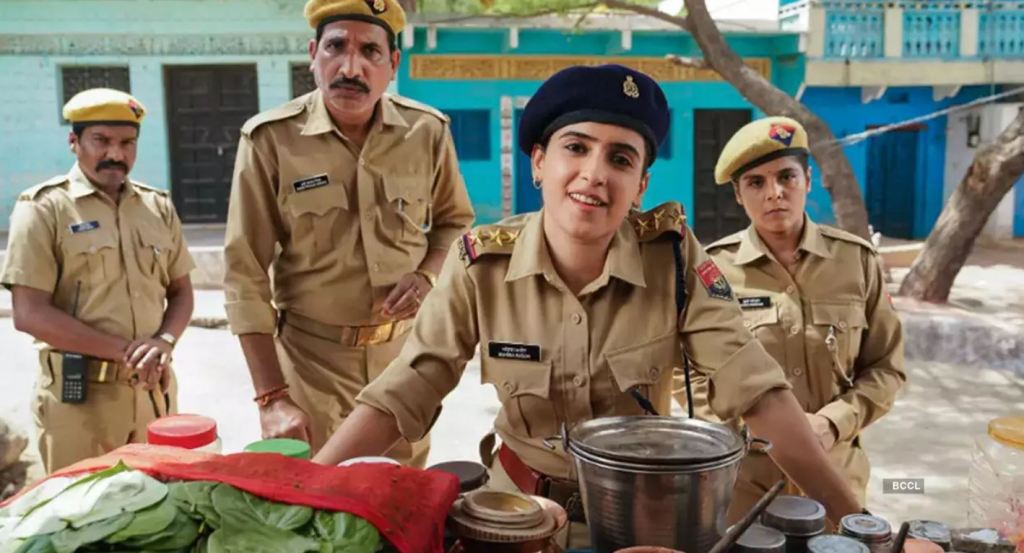[ad_1]
Writer Ashok Mishra, and his director son Yashowardhan, serve a sumptuous, thought-provoking, irresistible social satire.
Rating: ⭐️⭐️⭐️⭐️

By Mayur Lookhar
“Thieves have stooped to such low standards that they are now stealing kathal (jackfruit)”, rues constable Saurabh. “Our standard isn’t touching skies either. We are searching kathal,” investigating officer Mahima Basor is quick to tell her colleague.
Phew, what a predicament that Mahima [Sanya Malhotra], and even the audience, finds itself in. In a country where crimes galore, cops are under pressure to solve A Jackfruit Mystery. They are no ordinary jackfruits. The seeds were especially imported from Malaysia. The two Uncle Hong kathals belong to local politician Munnalal Pateria [Vijay Raaz]. Jeez, this surely isn’t an ego thing for mantri ji.
“Rajneeti mein, joh kaam sadachaar, uchh vichaar se nahi hote, kabhi kabhi achaar se ho jaate hai,” (In politics, when nobility and high thinking don’t tickle, a jar of pickle does the job,” the dining party president underlines the significance of the kathals to his host. Now, you know why Pateria is in such a pickle. Poor Mahima, her bosses, though will be in a soup if Pateria’s two kathals aren’t retrieved. But who would dare to steal Pateria’s jackfruits in Moba [pseudonym for Mahoba district (Uttar Pradesh), famous for its meetha paan]
It’s a question that has gripped the entire district as Mahima uses her wit to solve this jackfruit mystery. Though one theft, it gives rise to many Ka-T(h)ales.
Veteran writer Ashok Mishra and his director son Yashowardhan serve a sumptuous, thought-provoking, irresistible social satire. The Kathal theft opens our eyes to policing challenges, power play, bureaucracy, caste barriers, gender biases in a small town.
The first challenge stems from the Basor surname, where Mahima must ride through caste, gender biases to earn respect of her incompetent, some envious superiors/colleagues and the public at large. Though heckled by bureaucracy, system, Mishra chooses to arm his protagonist with a sharp mind and wit. She is hurt by the initial barbs, but doesn’t let that break her spirit. The system is, what it is. One must work within the system to find solutions.

Mahima is not afraid to put her body on the line, as revealed in the opening scene where the senior inspector tricks a notorious gangster, rapist in her trap. She is competent, but the Kathal case is perhaps thrown at her because her boss DSP Angrez Singh Randhawa doesn’t want to be first in the line of fire. Some envious colleagues are quietly hoping that the woman fails. Mahima’s first meeting with Pateria at the latter’s bungalow sees the minister lambast the humble cop for stepping foot on his velvet carpet. She is shaken, but doesn’t let the angst show on her face.
Mahima soon turns these biases to her advantage using with her wit. Sanya Malhotra effortlessly slips into the skin of her character, charming us with a virtuoso performance.
Mahima’s close aide Constable Saurabh Dwivedi [Anantvijay Joshi] underlines the challenges of hierarchy, both professional and social. Dwivedi’s early professional struggles also allay any anti-Brahmin fears. It is our introduction to Joshi and the man leaves a lasting impression.
Neha Saraf is adorable as the fellow constable Kunti, who is happy to never to be promoted. She is married to a lawyer, who is fond of his wife’s cooking skills than her policing.
Kathal also draws our attention to humble, local rooted journalists, who’ll never make it to marquee publications, channels. Anuj Sanghvi’s [Rajpal Yadav] Moba Samachar is more MOJO [Mobile Journalism]. Anuj’s reporting/news reading is dramatic but effective in the region. Like Basor, Anuj, too, faces a hard time in earning respect. Mahima herself doesn’t rate the local media man. Ah, another Bollywood film that demeans the media. However, Mahima soon realizes that this jackfruit mystery can’t be solved without the contribution of Anuj.
The local patrakar [reporter] gains respect. Sadly, there is often a price to pay for anti-establishment bravado. The many real life whistle blowers will empathise with the Anuj Sanghvis of the nation. Whilst the makers pay respect to the Anujs, you wish the same is followed by establishment, and the various media verticals in tinsel town. Anuj also rekindled memories of the Chand Nawabs [Bajrangi Bhaijaan], the Rakeshs [Peepli Live] and the Tillu Mandotiyas [An Action Hero] of the Bollywood. Yadav is simply terrific in his act.
Kathal subtly harps on so many social, professional, and political issues. The Pateria family is a classic case study in politics. What’s a big deal if any politician’s jackfruits are stolen? Ideally, it would be embarrassing if any neta even reports such theft. The master politician that he is, Munnalal Pateria turns the situation into his favour by telling in an interview that if a politician’s jackfruits are unsafe, is there any hope for a common man to find his lost valuables? He’s piled the pressure on the district police and gained full public empathy. Then on the personal side, the man’s dislike for his ghar jamai [son-in-law staying with him] underlines the essence of political equations. The poor son-in-law had respect till his father was the Chhatarpur MLA. Since then, he has to endure his father-in-law’s taunts.
Both Mahima and Saurabh have their own professional challenges. DSP Angrez Singh Randhawa [Gurpal Singh], too, has his pressures. For a man who is named Angrez, and has an opera song as his phone ringtone, he makes a meal in the opening press conference to announce the arrest of the gangster, rapist Veer Singh [Aeklavya Tomer]. Angrez Singh is not a cruel guy. He speaks in a measured, mellow tone to make Mahima understand how the system works. Be a leader, but always follow the orders from the top. Angrez Singh Randhawa has followed the same diktat to climb the success ladder.
There are many layers to Ashok and Yashowardhan Mishra’s Kathal. The core here is a serious social issue that viewers should decipher themselves. At the trailer launch, Ashok Mishra mentioned a peculiar thing that Hindi is a created language and there is a need to go beyond the urban Hindi to discover the true language, culture of our hinterland states. His Kathal largely rides on the Bundelkhandi tone. Maybe, it doesn’t quite cater to urban tastes, but credit to producer Guneet Monga, Netflix for sticking to the roots.
For long, Ashok Mishra has been the unsung hero in Shyam Benegal works – Bharat Ek Khoj TV series [1988], Samar [1998], Welcome to Sajjanpur [2008], and Well Done Abba [2009], He comes out of his mentor’s shadow to carve a new identity for himself with this Kathal. Not just a fine story, but Kathal stands out for Ashok Mishra’s brilliant writing, witty dialogues, taut screenplay. Having his son don the director’s hat, perhaps has its pros and cons. Yashowardhan, however, does full justice to his father’s brilliant social satire in a promising directorial debut.
A horse-for-courses casting ensures that Ashok Mishra’s Kathal has all the right flavours. Teen artiste Apoorva Chaturvedi, too, deserves praise. We leave it to the viewers to discover her story, her talent. Kathal feels more immersive through the apt production design, cinematography, background music and other technical aspects. Yashowardhan and his cinematographer Harshvir Oberai haven’t lost sight of the art of visual story telling. Constable Mishra [Govind Pandey], isn’t shy to flaunt his Brahmin tag, but come the critical hour, he goes to sleep after devouring the juiciest tandoori chicken. The image of Mishra and the chicken is subtly captured.
It’s really hard to pick a con, save why such a delightful social satire didn’t find it way to the theatres. However, as Ashok Mishra promised, Kathal [2023] truly has the navarasa [Nine Human Emotions]. Go savour this Kathal on Netflix.
[ad_2]
Source link



![Gauri Khan, Suhana Khan and Aryan Khan attend a birthday bash in the city; netizens wonder why Shah Rukh Khan’s eldest son doesn’t smile [View Pics]](https://webjek.com/wp-content/uploads/2023/01/Suhana-Khan-Aryan-Khan-Gauri-Khan1-600x315.png)










